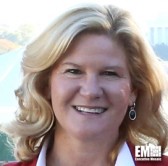
Susan Keys started the current chapter of her GovCon and information technology career last year when she took a vice president role at Avaya‘s federal business organization — Avaya Government Solutions.
Her career includes stops at commercial and GovCon firms such as Cisco, Lockheed Martin, Oracle and more recently Riverbed Technology.
Keys recently caught up with ExecutiveBiz to describe the areas of Avaya’s federal business she has focused on, the company’s push to help agencies adopt unified collaboration tools and the company’s expectations for networking technology demand this year.
ExecutiveBiz: What led you to join Avaya Government Solutions and what have you focused on since?
Susan Keys: When the opportunity presented itself to me, I took a hard look at Avaya’s market solutions and strategies. I call it a perfect storm because Avaya’s solutions matched the US government’s priorities on initiatives related to cloud, mobility, telework, cybersecurity, data center consolidation and the need for real collaboration.
Since joining Avaya, I’ve focused on mapping priorities and delivering effective enabling solutions, such as our engagement portfolio for unified communications, contact centers, mobility and video. Our GovOS solution provides a cloud alternative for unified communications and contact centers. This is great way to help the government achieve their “cloud first†initiative.
We support the government’s telework initiative and bring-your-own-device trends by extending our unified communication platform out to the network edge. We also focus on delivering our network and fabric solutions, specifically Shortest Path Bridging – an enabler for Fabric Connect Networks.. It is going to help agencies reduce the complexity of their operations and save operations and maintenance costs.
ExecutiveBiz: Describe the concept of unified collaboration and the tools agencies want to have in this area?
Susan Keys: At the simplest level, unified collaboration is bringing together phone, video, email, chat and social media channels so that you can use multi-channels to do your job. Communication barriers are erased and one can easily link to the right people with the right information at the right time. The location, the type of device or the preferred way of communication don’t matter.
Civilian and defense agencies are looking to use unified communications to be more productive, make better informed decisions, deliver better service to the citizen and support their mission. At the end of the day, we are seeing that the government has compressed budgets – having to do more with less. So the fact that agencies can achieve significant operational savings by using unified communications is very important to the government at this time.
ExecutiveBiz: How are agencies looking to use cloud computing technologies for unified collaboration?
Susan Keys: Many agencies are looking to unified communications right now to drive down costs and get economies of scale. One example is the U.S. Army. By using unified communications to move to the cloud, they can essentially scale up quickly without the huge investment in equipment upfront. They can get the service in a much simpler way and pay for it as they use it, versus having to do a lot of site installations.
ExecutiveBiz: What kind of demand in networking technologies does Avaya expect to see this year?
Susan Keys: The government is looking for networks that move it away from some of the complexities faced today. We now see agencies like DISA come out with RFIs for software-defined networks. We are seeing broad area announcements coming out from the intelligence community. They are looking to simplify their environments, which is something our networking solutions can provide. Agencies are always trying to do more with less and to streamline their operations.
For example, some are implementing a fabric connect network compared to other networks in order to improve their operations. The Department of Energy is heavily exploring SDNs to provide a high-speed network solution to 30 of their major Department of Energy sites and over a 100 different research and education networks.
ExecutiveBiz: Which consulting company did you formally own and what experiences do you lean on from that now?Â
Susan Keys: I started Tech Vision Consulting, a company focused on providing IT solutions to the government, as well as commercial companies that wanted to sell into the government. I conducted an IT governance study for my first customer, the NASA CIO. I did the same thing for the Jet Propulsion Lab with the CIO. Those were two of my largest customers.
I helped commercial companies sell across the entire business and sales continuum. I helped CACI create horizontal solutions. I worked with McDonald Bradley to package themselves up for sale, which they successfully did to ManTech.
I continue to lean on the entrepreneurial and growth approach that you have to have when you are starting a company. I’ve been able to develop a lot of repeatable offerings across the sales continuum that I am currently leveraging with my sales teams today, like account planning and leveraging market intelligence into accounts. I lean on the real importance of mapping customer priorities to our solution portfolios and determining how we can add value.




